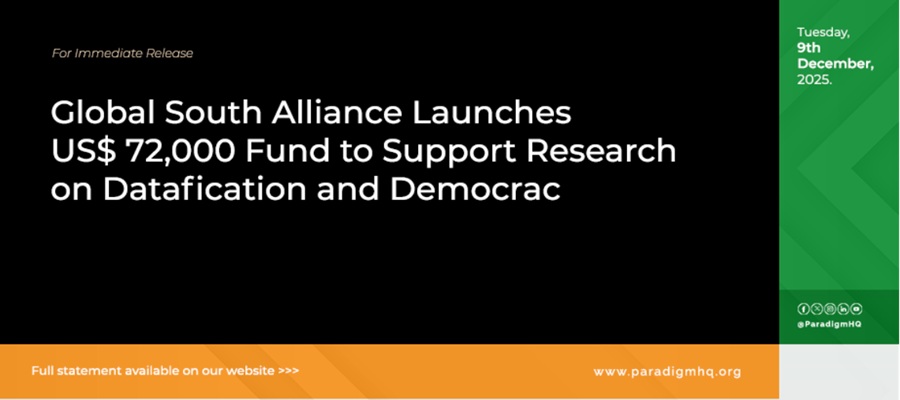Broadcasting
African Marketers Simply Cannot Afford to Ignore Snapchat: Here’s Why

By Alistair Errington, Snap Partner Director at Ad Dynamo by Aleph
Over the years, Snapchat has consistently defied its most ardent critics. The platform has grown from strength to strength rather than fading away as existing social networks mimic its features, and new ones, such as TikTok, target the same audience. This illustrates how people want more options and choices when it comes to social media (something that its critical advertisers understand).

As recorded by Statista, Snapchat boasts 347 million daily active users in Q2 2022, up more than 50 million from the same quarter in 2021. Data Reportal also sheds light on Snapchat’s presence with a total advertising reach of more than 617 million people. This puts it in the top 10 social networks globally. It is, in other words, a platform that advertisers simply cannot afford to ignore. This is as true on the African continent as it is anywhere else
In Nigeria, for example, Snapchat has more than 9 million users in addressable reach for advertising. This puts it on par with Instagram, and well ahead of platforms such as LinkedIn.
With this in mind, it is worth looking at what makes Snapchat so popular, why it’ll continue to be a good marketing option, and how advertisers can best take advantage of it.
Embracing technological evolution
Key to Snapchat’s success in recent years has been its willingness to continue evolving and embracing new technologies as they emerge. In particular, it utilises augmented reality (AR) in ways that appeal to its user base. Snapchat is a camera-first app, encouraging its audience to create personal authentic content featuring themselves.
For instance, some 250 million users make use of AR tools that allow them to add 3D experiences in the real world and overlay graphics on images every day. But the platform’s AR ambitions go far beyond augmenting the world only for entertainment. Earlier this year, Snapchat announced updates to its AR shopping features which make it easier for users to try out AR versions of a retailer’s product and to buy directly from the AR experience on Snapchat.
As a result, Snapchat isn’t just a place where brands can advertise to their customers. In fact, it’s more like a virtual showroom that allows people to see what products would look like on them or in their homes. ‘Product trial’ has a whole new meaning.
But even its more prosaic offerings give advertisers a lot to work with. Take Spotlight, its short-form video offering, for example. Spotlight offers a place where an infinite stream of full screen videos can be engaged with, tailored to the user’s interests. It saw instant success, growing 60% in activity year on year since mid-2021. Based on this growth, Snapchat announced earlier this year that they were testing ads on Spotlight, having successfully rolled them out in a revenue-sharing model with Snap Star creators.
Hyper-connected digital natives
It’s also important to highlight that Snapchat has been developing its technology for 10 years, and its followers have remained loyal through that evolution. Retaining a community that has grown with the app, Snapchat capitalises on the millennial generation and is constantly accruing a younger generation of users due to the cutting edge experiences it offers.
Zooming into Africa, these younger generations are becoming the centre of attention for Africa. The majority of purchasing power will reside in this audience, not to mention how connectivity in these countries becomes ubiquitous. Nigeria serves as a prime example of a market that is well positioned for digital growth – both in digital users and an audience to be capitalised on. With the combination of internet penetration currently sitting around 51%, and over 70% of the users on Snapchat being 21+ in Nigeria, the opportunity for advertisers is there in the short term to bring returns and prepped for the long term to invest in. Bundle this with a median age of 18 and the expected addition of 35 million more internet users by 2026 in Nigeria, and Snapchat anchors itself in the helm of a booming economy.
There is also a very exciting convergence taking place in the digital sphere with this spike in internet users: by 2025, nearly 75% of the global population and all social/communication apps will be frequent AR users. Right now, Snapchatters spend over 3 minutes a day engaging with AR experiences alone and more than 30 minutes on the app everyday – nevermind the fact that they open the camera over 30 times a day resulting in 2.4M snaps every minute around the world.
And one of the most interesting nuggets to these behaviours is that it’s done by an audience barely found anywhere else. On any given day, 95% of Snapchat users aren’t on TikTok, 84% of Snapchat users aren’t on Twitter and 47% of Snapchat users aren’t on Facebook. Snapchat hosts a unique audience.
The right messaging with the right partnerships
Of course, advertisers can’t simply hope to slap their existing messaging onto Snapchat templates and expect great results. They have to ensure that the messaging matches the platform and that they’re reaching the people they want with it.
Here, the right partner can help. Brands should look to work with a media sales partner that not only understands platforms such as Snapchat inside out but also has extensive experience working in growth markets like Nigeria.
In doing so, they can reap the full benefits of being on a rapidly growing platform that’s becoming increasingly significant on the African continent.
Broadcasting
Young Africans Hit Hardest by Online Gender Violence, Paradigm Initiative Reports

A new study, conducted by pan-African organisation, Paradigm Initiative (PIN), warns of an alarming surge in the prevalence of Technology-Facilitated Gender-Based violence, with 67 percent of respondents being victims of at least one or multiple forms of digital violence.

Online
Released on International Human Rights Day, the research exposes deep systemic failures, weak accountability, and unsafe online spaces driving a rapidly escalating epidemic across Cameroon, Kenya, Nigeria, Senegal, Zambia, and Zimbabwe.
PIN recognises that this gap limits both the understanding of TFGBV and the development of effective solutions. In response, this study adopts a survivor-centred approach that reframes how TFGBV is researched, discussed, and addressed. By prioritising survivors’ perspectives, the research uncovers the emotional, social, and systemic dimensions of digital violence that formal reports and statistics often obscure. It also interrogates how survivors navigate reporting systems, access justice, and play an informed role in digital spaces that are frequently hostile or unsafe.
A key finding of the study is that young people are disproportionately affected, with those aged 18–34 constituting the vast majority of survivors. Most incidents of TFGBV occurred on Facebook, WhatsApp, and X (formerly Twitter), underscoring how mainstream social media platforms continue to function as structurally unsafe spaces for many users—particularly women, activists, and advocates.
“Victims’ experiences range from sexual harassment, threats, and misogynistic attacks to severe violations such as stalking, non-consensual image sharing, hacking, sextortion, and identity-based harassment,” the report notes. “Personal testimonies reveal profound emotional, psychological, and reputational harm.”
The study also highlights that formal systems such as the police, employers, and public institutions, remain underutilised, largely due to fear, mistrust, or an expectation of inaction. While the findings expose wide-ranging gaps across platforms, institutions, and legal frameworks, they also highlight survivors’ resilience and their continued efforts to seek safer digital environments.
In light of these findings, PIN calls for urgent action to make online spaces safer for everyone, in line with this year’s Human Rights Day theme, “Human Rights, our everyday essentials.” Addressing these systemic gaps is critical to advancing democratic engagement, promoting media pluralism, fostering digital inclusion, and achieving gender equality across Africa.
Broadcasting
CKay’s “Love Nwantiti” Crosses Billion-Stream Mark on Spotify

Nigerian singer, songwriter, and producer CKay has officially surpassed one billion streams on Spotify with his breakout hit Love Nwantiti, making him one of the few African artists to reach this milestone and the first Nigerian solo act to do so.

Ckay
The rise of the emotional Afrobeats anthem
Originally an early hit when it dropped in 2019, “Love Nwantiti” (released on CKay’s EP – CKay the First) began as a slow-burn masterpiece that captured a global audience. The song broke out by blending the grooving rhythm of Afrobeats with an emotional feeling and an entrancing melody, a sound CKay himself pioneered and coined as “Emo-Afrobeats,” fusing African rhythms with raw, heartfelt emotion.
The song, which translates to “sweet gentle love” in the Igbo language, communicates an intense desire for a love interest. Its journey from a homegrown Nigerian track to a cultural sensation fueled by countless dance challenges, social virality, and international remixes is proof of the widespread power of its sound. The song remains a fixture on playlists globally, with over 3.9 million playlist adds and sustained streaming momentum across continents.
A solo milestone, a global legacy
Love Nwantiti’s sustained global appeal is undeniable: in the last 28 days alone, listeners from the United States , India,, Indonesia, Brazil , and the United Kingdom continue to press play, proof of the track’s staying power well beyond its viral peak.
This achievement places CKay in an elite group of African artists with billion-stream records on Spotify, which includes hits driven by collaborations with Nigerian artists, such as Drake’s One Dance (featuring Wizkid and Kyla), Future’s Wait For U (featuring Drake and Tems), and Rema’s Calm Down (featuring Selena Gomez), and solo song Water, by Tyla.
CKay achieved this historic mark with a solo, non-collaborative lead release by a Nigerian artist. This distinction highlights his unique vision and singular impact as both a writer and performer, making him a true torchbearer for the new generation of African music talent.
“Love Nwantiti” is more than a viral hit; it is a cultural reset. Demonstrating the rich storytelling and emotional depth of his sound, CKay didn’t just break borders, he built a powerful bridge for the global crossover of authentic African music, proving its resonance on the global stage.
CKay’s success is a signal for the future of African music on the global stage. Let us know if you’d like more on CKay’s journey or the song’s global streaming story.
Broadcasting
Global South Alliance Launches $72,000 Datafication and Democracy Fund to Support 2026 Research Projects

The Global South Alliance, a coalition of 26 digital rights organizations, launched today the second edition of the “Datafication and Democracy Fund” on December 9.

Global South Alliance
The Fund will provide more US$ 72,000 to support research and advocacy projects focused on datafication and democracy to be implemented in 2026.
The Datafication and Democracy Fund was launched during the fourth edition of the Data Privacy Global Conference, organized in São Paulo, Brazil. The Global South Alliance is jointly managed by Data Privacy Brasil, Aapti Institute, and Paradigm Initiative.
The members are Asociación por los Derechos Civiles, Bolo Bhi, Center for Communication and Governance, CIPESA, Derechos Digitales, Digital Rights Foundation, Dukingire Isi Yacu, Internet Bolivia, Pollicy, Research ICT Africa, Fundación Multitudes, InternetLab, Thraets, Jokkolabs Banjul, Aláfia Lab, Centre for Policy Alternatives, KICTANET, Tech Global Institute, Freedom Forum, TEDIC, Digital Access, Center for AI and Tech Innovation for Democracy and Masaar.
The call for proposals is open to non-profit, non-governmental organizations based in the Global South working on digital rights and related public policy issues. Previously supported organizations have addressed topics such as online child protection, data governance in electoral processes, biometric technologies in stadiums and large events, mandatory biometric data collection of migrants, and discriminatory surveillance and datafication practices.
According to the launch announcement, the Datafication and Democracy Fund “aims to finance research and public policy analysis projects that address critical questions arising from the impact of datafication on democracy.” The Alliance emphasizes that “datafication is a deep and complex process of social transformation: it shapes the provision of public services mediated by information technologies, the emergence of digital public infrastructures, the data-driven nature of elections, the reconfiguration of markets and platforms, and many aspects of civic life. Beyond deliberative processes and elections, datafication exacerbates democratic challenges such as transparency, due process, and respect for citizens’ autonomy.”
Selected applicants will receive grants of up to US$ 8,000 to support their research projects. Depending on the proposals submitted, between 8 and 12 projects will be funded. All funded projects must be carried out during 2026.
Applicants are required to submit:
A one-page cover letter outlining the organization’s background, experience, and motivation for participating in the research program;
A proposal of up to five pages detailing the topic, scope, methodology, expected results, and relevance of the project to digital rights and democracy in the Global South;
A detailed budget, not exceeding US$ 8,000, specifying how resources will be allocated across the proposed project’s components.
Applications must be submitted in English by January 30th 2026, through the designated online form.

 E-Financial2 days ago
E-Financial2 days agoCBN Rejigs Financial Inclusion Strategy to Boost Economic Growth

 E-Financial2 days ago
E-Financial2 days agoSEC Urges IST to Freeze all CBEX Bank Accounts in Nigeria

 News2 days ago
News2 days agoFG to Use Digital Economy Initiatives to Curb Corruption Among Youth

 E-Business2 days ago
E-Business2 days agoFinancial Sector Faced AI, Blockchain and Organised Crime Threats in 2025 – Report

 Broadcasting2 days ago
Broadcasting2 days agoEnd of an Era as Multichoice Delists from JSE After Canal+ Takeover

 Telecom2 days ago
Telecom2 days agoCOUCH 2025 Grand Finale Highlights Student Breakthroughs, Secures Government Pledge for University Research Commercialization

 Broadcasting2 days ago
Broadcasting2 days agoGlobal South Alliance Launches $72,000 Datafication and Democracy Fund to Support 2026 Research Projects

 Telecom2 days ago
Telecom2 days agoGoogle Invests $2.1m to Boost Nigeria’s AI Development


























